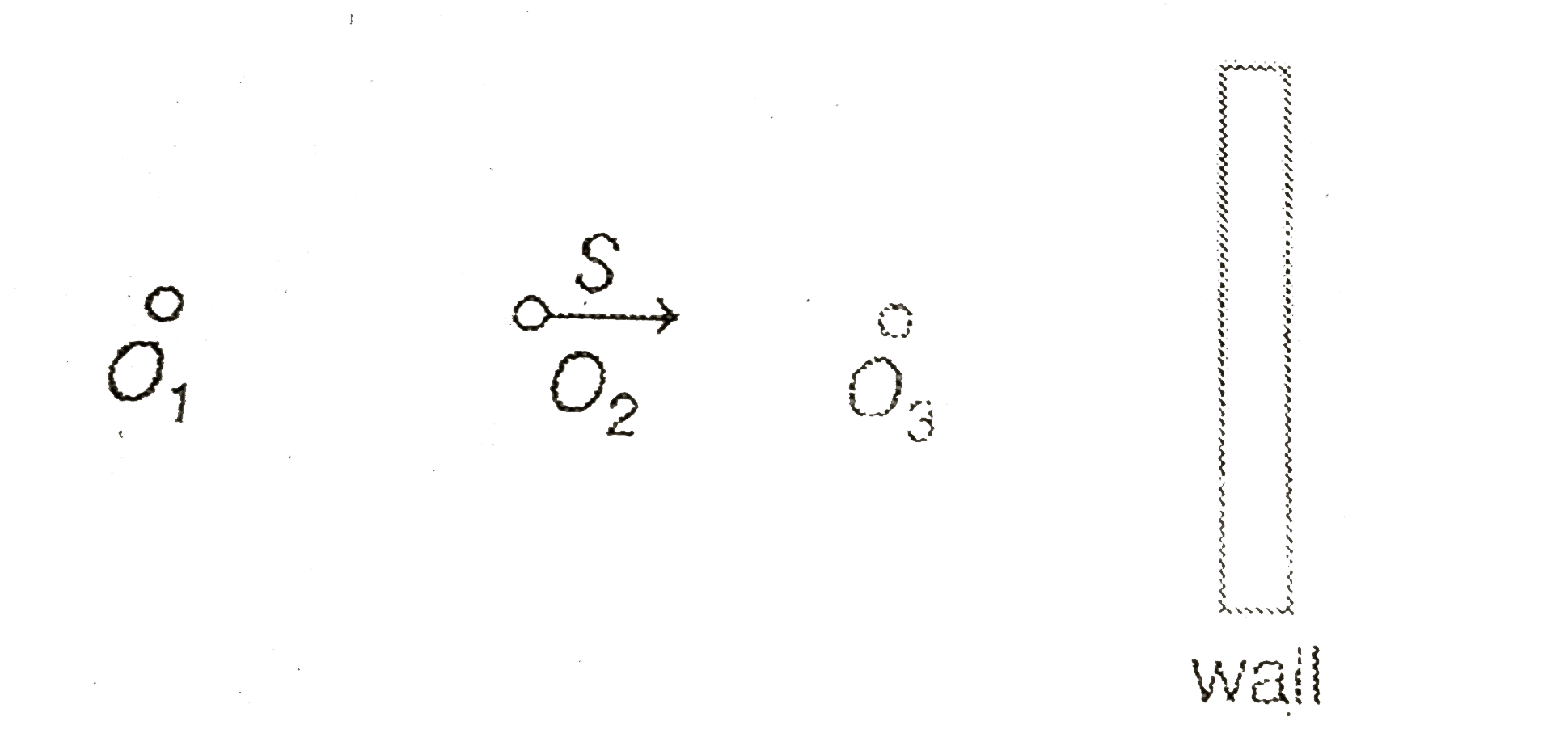Two sound sources are moving in opposite directions with velocities v1andv2(v1>v2) . Both are moving away from a stationary observer. The frequency of both the sources is 900 Hz. What is the value of v1−v2 so that the beat frequency aboserved by the observer is 6 Hz. speed of sound v= 300 m/s given ,that v1andv2<<v
1ms
2ms
3ms
4ms
The correct Answer is:B
f1=900(300300+v1)
≅900(1+v1300)−1
=900−3v1
similarly,
f2=900(300300+v2)=900−3vs
f2−f1=6
3(v1−v2)=6
3(v1−v2)=6
or v1−v2=2ms
Topper's Solved these Questions
- SOUND WAVES AND DOPPLER EFFECTBOOK - CENGAGE PHYSICS ENGLISHCHAPTER - SOUND WAVES AND DOPPLER EFFECTEXERCISE - Multiple Correct
44 Videos
- SOUND WAVES AND DOPPLER EFFECTBOOK - CENGAGE PHYSICS ENGLISHCHAPTER - SOUND WAVES AND DOPPLER EFFECTEXERCISE - Assertion-Reasoning
24 Videos
- SOUND WAVES AND DOPPLER EFFECTBOOK - CENGAGE PHYSICS ENGLISHCHAPTER - SOUND WAVES AND DOPPLER EFFECTEXERCISE - Subjective
56 Videos
- RIGID BODY DYNAMICS 2BOOK - CENGAGE PHYSICS ENGLISHCHAPTER - RIGID BODY DYNAMICS 2EXERCISE - Interger
2 Videos
- SUPERPOSITION AND STANDING WAVESBOOK - CENGAGE PHYSICS ENGLISHCHAPTER - SUPERPOSITION AND STANDING WAVESEXERCISE - Comprehension Type
5 Videos
Similar Questions
Two sources of sound are moving in opposite directions with velocities V1 and V2(V1>V2). Both are moving away from a stationary observer. The frequency of both the source is 1700Hz. What is the value of (V1−V2) so that the beat frequency observed by the observer is 10Hz. Vsound=340m/s and assume that V1 and V2 both are very much less than Vsound.
View SolutionTwo sound sources are moving away from a stationary observer in opposite direction with velocities V1 and V2(V1>V2). The frequency of both the sources is 900 Hz. V1 and V2 are both quite less than speed of sound, V=300ms. Find the value of (V1−V2) so that beat frequency observed by observer is 9 Hz. (in m/s).
View Solution
Knowledge Check
When two sound sources of the same amplitude but of slightly different frequencies v1 and v2 are sounded simultaneously, the sound one hears has a frequency equal to
A|υ1−υ2|B∣∣∣υ1−υ22∣∣∣C√υ1υ2D|υ1+υ2|
A source of sound is travelling towards a stationary observer. The frequency of sound heard by the observer is 25% more that the actual frequency. If the speed of sound is v, that of the source is
View SolutionA source of sonic oscillations with frequency n=1700Hz and a receiver are located on the same normal to a wall. Both the source and receiver are stationary, and the wall recedes from the source with velocity u=6.0ms. Find the beat frequency registered by the receiver. The velocity of sound is v=340ms.
View SolutionA source of sonic oscillations with frequency n=1700Hz and a receiver are located on the same normal to a wall. Both the source and receiver are stationary, and the wall recedes from the source with velocity u=6.0ms. Find the beat frequency registered by the receiver. The velocity of sound is v=340ms.
View Solutionthe frequency changes by 10 % as the source approaches a stationary observer with constant speed vs. What would be the percentage change in frequency as the sources reaccedes the observer with the same speed ? Given , that vs<<v(v= speed pf sound in air )
View SolutionGiven frequency of source f=100Hz,vs=20m/sand v=330m/s.Thebeatequenciesf_(1)andf_(2) are

View SolutionAn observer moves on the same line on which two sources of sound of frequency 660Hz are present. The observer observes beat frequency of 10Hz. If speed of sound is 300m/s then speed of the observer is:
View SolutionTwo masses, m1 and m2 , are moving with velocities v1 and v2. Find their total kinetic energy in the reference frame of centre of mass.
View Solution
